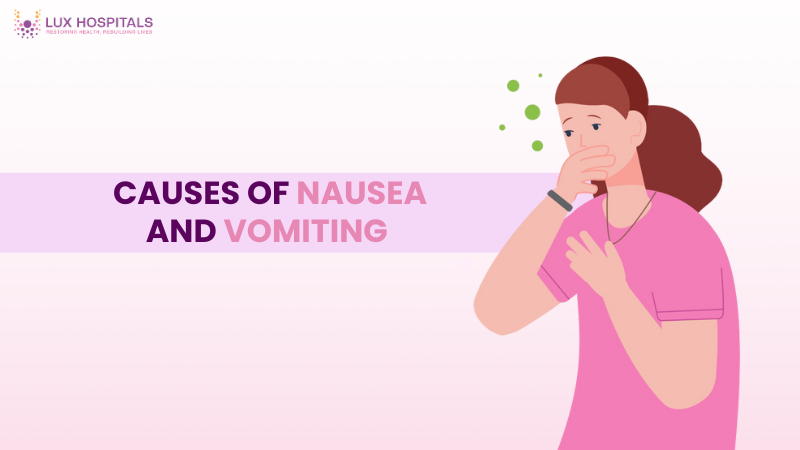Understanding Nausea and Vomiting: Common Triggers and Effective Treatments

Feeling queasy or throwing up can disrupt your day and signify something more serious. Knowing the causes of nausea and vomiting can help you identify what’s going on in your body and when to seek medical help. These symptoms can be temporary or signal something more serious, depending on their cause and duration. Learning about the Causes of Nausea and Vomiting empowers you to make informed decisions about your health.
10 Key Factors That Lead to Nausea and Vomiting
Nausea and vomiting are not conditions themselves but symptoms of various underlying issues. From infections and food reactions to psychological stress and chronic illness, the Causes of Nausea and Vomiting are wide-ranging. You can better control your symptoms if you are aware of these triggers. Effectively and know when to seek medical advice.
1. Gastroenteritis and Food Poisoning
Infections caused by viruses (like norovirus), bacteria (like salmonella), or parasites are some of the most common Causes of Nausea and Vomiting. These infections cause inflammation in the intestines and stomach, resulting in cramping, nausea, vomiting, and diarrhea. This ailment is typically caused by polluted water or poor food hygiene.
2. Motion Sickness and Inner Ear Disorders
An essential part of the inner ear is balance and spatial orientation. When disrupted by car rides, boat travel, or conditions like labyrinthitis, it can trigger dizziness and nausea. Causes of Nausea and Vomiting often include motion-related stimuli that confuse the brain’s perception of movement.
3. Pregnancy (Morning Sickness)
One of the earliest signs of pregnancy is nausea, especially during the first trimester. Morning sickness is a typical physiological response to hormonal changes, especially increased levels of hCG (human chorionic gonadotropin). For many women, pregnancy is one of the primary Causes of Nausea and Vomiting.
4. Medications and Medical Treatments
Certain medications, such as chemotherapy, antibiotics, and painkillers, may irritate the stomach lining or affect brain receptors that trigger nausea. This side effect is widespread in cancer patients undergoing treatment. Drug-related reactions remain one of the under-recognized Causes of Nausea and Vomiting in both acute and chronic settings.
5. Gastroesophageal Reflux Disease (GERD)
Reflux of stomach acid into the esophagus causes GERD. It irritates the lining and causes symptoms like heartburn, nausea, and regurgitation. Chronic acid reflux may cause persistent queasiness, especially after meals. GERD is one of the gastrointestinal Causes of Nausea and Vomiting that can affect quality of life.
6. Migraine Headaches
Migraines are not just intense headaches—they often cause nausea and vomiting. Serotonin is a brain neurotransmitter that affects mood. and gut function triggers these symptoms. For many sufferers, migraines are a neurological cause of Nausea and Vomiting.
7. Psychological Factors: Anxiety and Stress
Emotional disturbances such as anxiety, stress, and panic attacks can manifest physically through gastrointestinal symptoms. The brain-gut connection means that emotional health can directly impact your digestive system. Psychological distress is among the non-physical Causes of Nausea and Vomiting that shouldn’t be ignored.
8. Intestinal Obstruction
A blockage in the intestines prevents food and liquid from passing through, leading to cramping, bloating, and vomiting. This is a medical emergency and can be due to hernias, tumors, or scar tissue from previous surgeries. In such cases, obstruction becomes one of the urgent Causes of Nausea and Vomiting.
9. Alcohol and Substance Use
Excessive alcohol consumption or recreational drug use can irritate the stomach lining and disrupt normal digestion. Withdrawal from substances can also lead to nausea and vomiting. Substance-related issues are growing contributors to the Causes of Nausea and Vomiting, especially among young adults.
10. Cholecystitis and Pancreatitis
Inflammation of the gallbladder (cholecystitis) or pancreas (pancreatitis) can result in intense stomach pain, frequently with vomiting. vomiting. These conditions typically arise from gallstones or alcohol abuse and require prompt medical attention. These inflammatory diseases are serious Causes of Nausea and Vomiting that should not be overlooked.
Prevention of Nausea and Vomiting
Avoiding identified triggers and adopting a conscious lifestyle are key to preventing the causes of nausea and vomiting.
- Eat light and frequent meals to avoid overloading your digestive system.
- Practice food safety by avoiding undercooked or expired items.
- Drink enough water to support the healthy operation of your digestive system.
- Avoid strong odors or motion triggers if you are prone to motion sickness.
- Manage stress through mindfulness, deep breathing, or therapy.
- Limit your usage of drugs and alcohol because these can irritate your stomach.
Treatment for Nausea and Vomiting
Treatment depends on the underlying Causes of Nausea and Vomiting, but general remedies include
- Hydration: Sip water, oral rehydration solutions, or electrolyte drinks.
- Dietary adjustments: Stick to bland foods like crackers, bananas, rice, and toast.
- Medications: Antiemetics like ondansetron or promethazine can help control symptoms.
- Rest and recovery: Lying down in a quiet, dark room can reduce nausea, especially during migraines.
- Ginger or peppermint: These natural remedies are effective for mild cases.
When to See a Doctor?
You should consult a healthcare provider if:
- Nausea and vomiting last longer than 24–48 hours, especially without an apparent cause.
- You notice signs of dehydration, such as dry mouth, dark urine, or dizziness.
- Vomiting contains blood or appears like coffee grounds.
- You have a high fever, excruciating stomach discomfort, or confusion.
- There’s a possibility of poisoning, head injury, or pregnancy complications.
Persistent or severe symptoms could point to serious Causes of Nausea and Vomiting that require professional evaluation and treatment.
Conclusion
It’s critical to comprehend the causes of nausea and vomiting for managing this uncomfortable symptom effectively. The reasons can vary widely from infections and pregnancy to stress and chronic illnesses. Always get medical advice if your symptoms are severe or persistent for the correct diagnosis and care. Whether the cause is mild or severe, proper hydration and timely medical care are essential. By being informed about the Causes of Nausea and Vomiting, you can take proactive steps toward better digestive health and overall well-being.
Frequently Asked Questions
The Most Common Reasons for Vomiting and Nausea include viral gastroenteritis, motion sickness, pregnancy, and medication side effects. Food poisoning and stress are also frequent contributors. Effective treatment depends on determining the underlying reason.
You should seek medical attention if nausea and vomiting last more than 24–48 hours, are accompanied by severe pain, or show signs of dehydration. Blood in vomit or a high fever also requires urgent care. These could signal severe underlying conditions.
Yes, stress and anxiety can trigger the brain-gut axis and lead to physical symptoms like nausea and even vomiting. This is due to hormonal and neural changes affecting your digestive system. It's a psychological contributor to the Causes of Nausea and Vomiting.
Not always—vomiting can result from temporary issues like motion sickness or mild food intolerance. However, symptoms that are severe or persistent should be assessed. Early diagnosis helps prevent complications from more serious Causes of Nausea and Vomiting.
Bland foods like toast, crackers, bananas, and rice are usually well-tolerated. Ginger, peppermint tea, and small sips of clear fluids can also soothe the stomach. These help manage milder Causes of Nausea and Vomiting.
Yes, dehydration can make symptoms worse and create a cycle of continued vomiting. Rehydration with fluids and electrolytes is essential. It's important to break the cycle caused by some Causes of Nausea and Vomiting




















